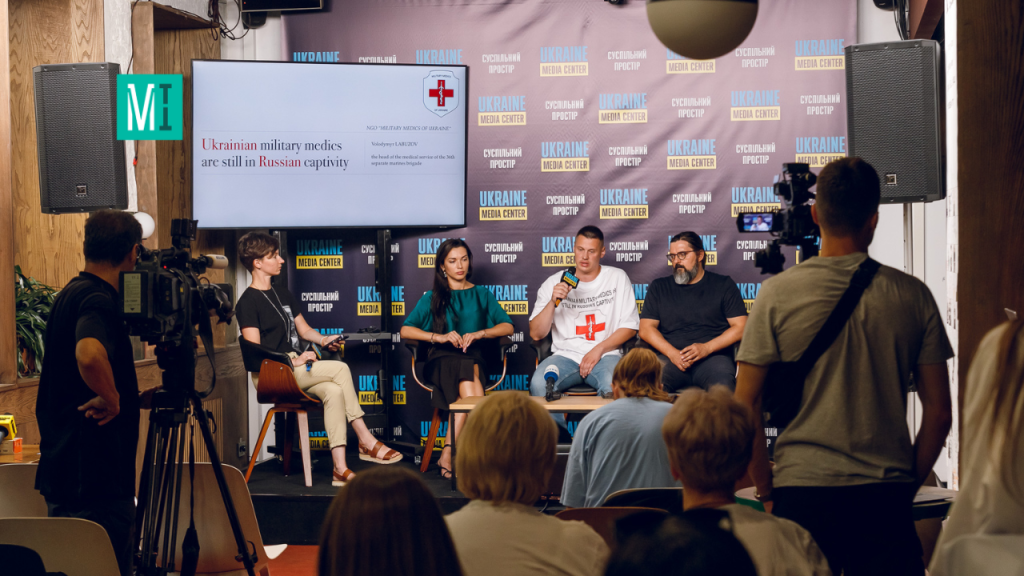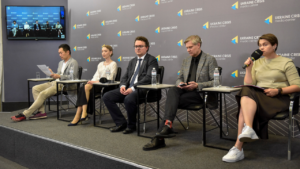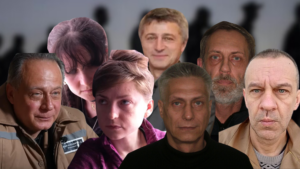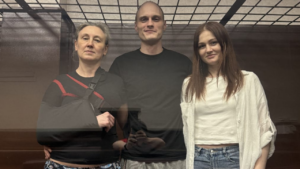The Families of Captured Medics are Demanding Stricter Sanctions against Russian Medical Practices

The International Committee of the Red Cross confirmed the detention of at least 60 Ukrainian doctors in Russian captivity. Meanwhile, the Media Initiative for Human Rights currently lists more than a hundred medical professionals imprisoned by Russia. Human rights activists estimate that the number of such detainees could exceed 500. This was highlighted by participants at the press conference ‘How to Free Ukrainian Medics from Russian Captivity.’

Families of captured medics.
Russia is illegally holding Ukrainian medics in captivity, which is prohibited by international humanitarian law. However, the fact that someone is part of the medical personnel often triggers Russian military forces and representatives of other law enforcement agencies of the Russian Federation. This was stated by Volodymyr Labuzov, the head of the medical unit of the 36th Marine Brigade, who was released from captivity in December 2022.
“While you are in captivity, you are nobody. You are just a body. If they want to beat you, they will. If they want the whole cell to sing, they will sing. There was no more humane treatment towards me as a medic. They beat with their hands, feet, batons, and always with a taser.
The food did not meet basic human needs at all. Personally, I lost over 20 kilograms. And if you appeal to the Geneva Conventions, they ask, “Aren’t you too smart?!” And after that, you get a stool or a baton thrown at you,” the former captive recalls.

Volodymyr Labuzov, head of the medical unit of the 36th Marine Brigade, released from captivity in December 2022
Volodymyr reports that Ukrainian medics were often accused of abusing Russian prisoners and trafficking their organs.
“I was always accused of trafficking genital organs. They constantly asked about biological laboratories, saying that if I was a medic, I had to be involved in a program for developing biological weapons, and therefore knew where the laboratories were located and which Western ‘professors’ worked there,” Labuzov recounts.
Andrii Yakovliev, a lawyer and expert in international humanitarian law with the Media Initiative for Human Rights, explains that there is an outdated provision under which medics can sometimes be detained for the duration of treating prisoners. However, in the case of Russia, Ukrainian medical personnel are not just held for a certain period; they are systematically deported to Russian territory and detained for years in various prisons, penal colonies, and detention centers, just like other prisoners of war. The expert notes that this reflects a Russian state policy.

Andrii Yakovliev, a lawyer and expert in international humanitarian law with the Media Initiative for Human Rights
“When a medic is imprisoned, it essentially means someone is being deprived of medical care. And when such detention occurs systematically and on a large scale, with the use of torture, it can be considered a crime against humanity,” Yakovliev highlighted.
The expert asserts that the international community needs to recognize that the imprisonment of medics in itself constitutes a crime. Subsequently, the International Criminal Court should initiate appropriate criminal proceedings and issue arrest warrants both for the perpetrators and the organizers.
“The next essential step is to ensure that court verdicts are enforced by as many countries as possible. This could influence the future behavior of the Russians and, in turn, reduce the suffering of detainees, including medics,” Andrii Yakovliev emphasized.
In his turn, Andrii Kryvtsov, head of the NGO ‘Military Medics of Ukraine,’ which represents the families of 46 captive medics, shared that the organization is actively pressuring the international community and consistently highlighting the crimes Russia is committing against Ukrainian medics.
“We have repeatedly provided information to various international organizations, including addressing the World Health Organization. They were deeply concerned. But on the third day of this concern, Russia launched a missile attack on the Okhmatdyt hospital,” he noted.

Andrii Kryvtsov, head of the NGO ‘Military Medics of Ukraine’ (on the screen)
Kryvtsov also urged Ukrainian doctors and medical researchers to act as ambassadors for captive military medics around the world and to advocate for increased pressure on the Russian Federation on international platforms. Among other things, the NGO ‘Military Medics of Ukraine’ suggests:
- Boycott of Russian doctors and researchers at international forums and conferences.
- Imposition of a ban on importing all medical goods into Russia except for essential equipment and medications. Sanctions should also include cosmetic and aesthetic products that are not vital.
- Extension of economic sanctions to medical and research institutions. Russian institutions must be deprived of international funding and cooperation until Russia ceases its actions and releases all captured medics.
- Public condemnation and diplomatic pressure.
The press conference also featured Professor Michele Heisler, Medical Director of the NGO ‘Physicians for Human Rights,’ and Kateryna Amosova, Professor of the Department of Cardiology, Instrumental and Laboratory Diagnostics at V.N. Karazin Kharkiv National University. Both emphasized the unacceptability of capturing and detaining Ukrainian medics.
Ms. Heisler specifically stated that ‘Physicians for Human Rights,’ along with Ukrainian human rights defenders, is meticulously documenting Russia’s brutal attacks on Ukraine’s medical infrastructure. To date, over 1,100 attacks have been recorded.

Michele Heisler, Medical Director of the non-governmental organization ‘Physicians for Human Rights’
“It is a doctor’s professional duty to treat those in need. All countries, including Russia and Ukraine, have signed the Geneva Conventions. They are obligated to adhere to the requirements of these conventions, particularly regarding the protection of medical personnel.”
“We are working to mobilize the support from the medical community worldwide and will strive to ensure that all those responsible for crimes against medical personnel are held accountable and that medics finally achieve their freedom,” Michelle Heisler noted.
At the same time, Kateryna Amosova emphasized that the number of medical personnel affected by Russia’s war against Ukraine is significantly higher than the official figures.
“Our colleagues are being held in captivity under inhumane conditions. They didn’t just fulfill their medical duty; they exceeded it! And now they need our help, our voices in support of initiatives for their immediate release,” Amosova stressed.

Kateryna Amosova, Professor of the Department of Cardiology, Instrumental and Laboratory Diagnostics at V.N. Karazin Kharkiv National University (on the screen)
Viktoriia Tsymbaliuk, coordinator of family support projects at the Coordination Headquarters for the Treatment of Prisoners of War, reported how the state seeks to secure the release of Ukrainian medics from illegal captivity. As she noted, involving a third country as a mediator could be a tool for repatriating detainees.
“Ukraine is open to considering a third country for the repatriation of prisoners. All countries are aware of this. We would like to see them participating in this process. Therefore, as soon as any country expresses its willingness to take on this role, Ukraine will consider such an opportunity,” Tsymbaliuk highlighted.

Viktoriia Tsymbaliuk, coordinator of family support projects at the Coordination Headquarters for the Treatment of Prisoners of War
When asked whether third countries are being engaged specifically in releasing medics as a separate category of Russian detainees, Viktoriia Tsymbaliuk responded that no country has taken such an initiative yet. However, the Coordination Headquarters is open to suggestions:
“Regarding the repatriation of medics, as far as I am aware, no such willingness has been expressed. Therefore, we call on the international community: If you have the capacity and political will to act as a mediator for the release of our medics from captivity, we are open to proposals. This is what the prisoners are waiting for, what their relatives are waiting for, what we are all waiting for.”
Watch the recording of the conference here.
This project is implemented with the support of the Veteran Hub. The organization may not share the views expressed within the project.







